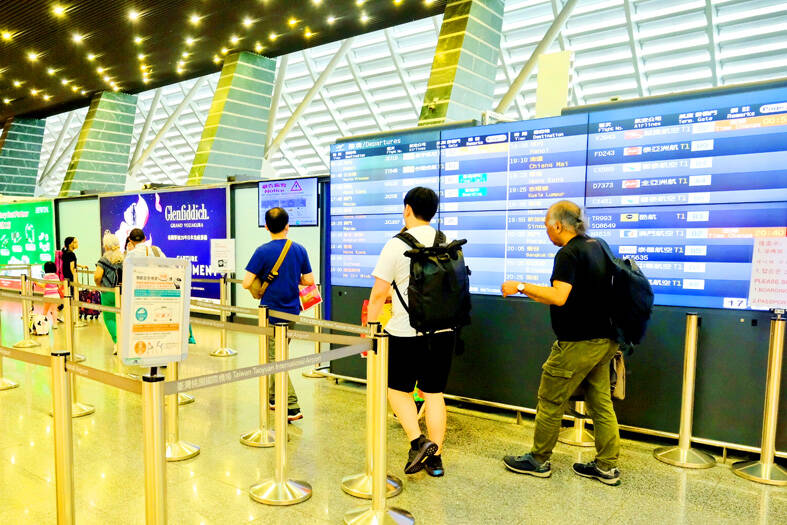Taoyuan International Airport Corp (TIAC) yesterday announced that, starting in the fall, it would expand its “one-stop security” policy by waiving carry-on baggage checks for transit passengers arriving from the US.
Since 2019, transit passengers arriving from the US have been exempt from having their checked luggage examined by airport security personnel at Taiwan Taoyuan International Airport, the airport operator said.
The one-stop security policy is implemented in accordance with Annex 17 to the Convention on International Civil Aviation and International Civil Aviation Organization Aviation Safety Manual, the company said.

Photo: CNA
It stipulates that if departure airports have been proven, through document reviews and on-site inspections, to adopt stricter or comparable aviation security measures than those adopted by connecting airports, passengers arriving from departure airports would be waived from security rescreening of bodies, carry-on baggage and checked luggage, the company said.
In 2019, travelers from the US were the largest source of transit passengers in Taiwan at 25 percent, the company said, adding that the ratio has climbed to nearly 30 percent this year.
Most transit passengers are headed to Vietnam, Indonesia or the Philippines, while those transferring to Singapore, Malaysia, Thailand and other Southeast Asian cities have also gradually increased, it said.
The expanded implementation of the one-stop security policy would optimize traffic flow of transit passengers at Taiwan Taoyuan International Airport, spare transit passengers the hassle of repeat screenings and give them more time to stay in the airport’s commercial areas, the company said.
It would also reduce the need for more personnel from the Aviation Police Bureau, it added.
“To implement the policy, we have made some preparations in advance, including installing new access control facilities and coordinating with airlines and the Aviation Police Bureau to separate passengers,” the company said.

‘CORRECT IDENTIFICATION’: Beginning in May, Taiwanese married to Japanese can register their home country as Taiwan in their spouse’s family record, ‘Nikkei Asia’ said The government yesterday thanked Japan for revising rules that would allow Taiwanese nationals married to Japanese citizens to list their home country as “Taiwan” in the official family record database. At present, Taiwanese have to select “China.” Minister of Foreign Affairs Lin Chia-lung (林佳龍) said the new rule, set to be implemented in May, would now “correctly” identify Taiwanese in Japan and help protect their rights, the Ministry of Foreign Affairs said in a statement. The statement was released after Nikkei Asia reported the new policy earlier yesterday. The name and nationality of a non-Japanese person marrying a Japanese national is added to the

AT RISK: The council reiterated that people should seriously consider the necessity of visiting China, after Beijing passed 22 guidelines to punish ‘die-hard’ separatists The Mainland Affairs Council (MAC) has since Jan. 1 last year received 65 petitions regarding Taiwanese who were interrogated or detained in China, MAC Minister Chiu Chui-cheng (邱垂正) said yesterday. Fifty-two either went missing or had their personal freedoms restricted, with some put in criminal detention, while 13 were interrogated and temporarily detained, he said in a radio interview. On June 21 last year, China announced 22 guidelines to punish “die-hard Taiwanese independence separatists,” allowing Chinese courts to try people in absentia. The guidelines are uncivilized and inhumane, allowing Beijing to seize assets and issue the death penalty, with no regard for potential

‘UNITED FRONT’ FRONTS: Barring contact with Huaqiao and Jinan universities is needed to stop China targeting Taiwanese students, the education minister said Taiwan has blacklisted two Chinese universities from conducting academic exchange programs in the nation after reports that the institutes are arms of Beijing’s United Front Work Department, Minister of Education Cheng Ying-yao (鄭英耀) said in an exclusive interview with the Chinese-language Liberty Times (the Taipei Times’ sister paper) published yesterday. China’s Huaqiao University in Xiamen and Quanzhou, as well as Jinan University in Guangzhou, which have 600 and 1,500 Taiwanese on their rolls respectively, are under direct control of the Chinese government’s political warfare branch, Cheng said, citing reports by national security officials. A comprehensive ban on Taiwanese institutions collaborating or

STILL COMMITTED: The US opposes any forced change to the ‘status quo’ in the Strait, but also does not seek conflict, US Secretary of State Marco Rubio said US President Donald Trump’s administration released US$5.3 billion in previously frozen foreign aid, including US$870 million in security exemptions for programs in Taiwan, a list of exemptions reviewed by Reuters showed. Trump ordered a 90-day pause on foreign aid shortly after taking office on Jan. 20, halting funding for everything from programs that fight starvation and deadly diseases to providing shelters for millions of displaced people across the globe. US Secretary of State Marco Rubio, who has said that all foreign assistance must align with Trump’s “America First” priorities, issued waivers late last month on military aid to Israel and Egypt, the